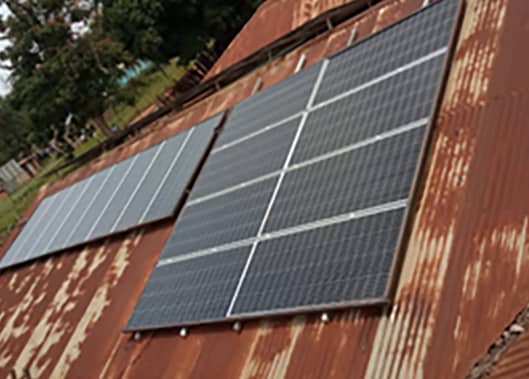Aptech Africa recently designed, supplied, installed and commissioned three off grid solar systems for educational resources at HSI in Bor and Yei in a project funded by UNFPA.
One system was installed at the HSI in Bor County located in Jongei state and two others installed in Yei County located in Central Equatorial State. All the systems are roof mounted and stand alone with a total of 18kWp and 115.2kWh.
The system in Bor consists of a 9kWp of Soleil Power monocrystalline panels with 57.6kWh power battery storage of Soleil Power lead acid batteries, a Victron Multiplus 5,000VA and two Victron MPPT 150/100A Smart Solar charge controllers.
Two systems were installed in Yei, one comprising of 3kWp solar generator of soleil panels with a19.2kWh battery bank of Soleil Power batteries, Victron Multiplus 2KVA /24V and Victron MPPT 150/100 Smart Solar charge controller whereas the other consists of 6kWp solar generator of solar panels and 38.4kWh battery bank of Soleil Power batteries with a Victron Multiplus 5KVA /48V and Victron MPPT 150/100 Smart Solar charge controller.
The institute being in a relatively remote area, there is a challenge of unstable power supply thus Aptech Africa was glad to partner with UNFPA to install these systems to benefit up to 500 people including the administration, staff and students of the Health Science Institutes by having power throughout the day which ensures that the teaching activities of the institute run smoothly undisturbed during the day especially in the lab and hall where different practical sessions and presentations are done which require availability of uninterrupted power supply.
Several socio-economic and environmental benefits are expected from this installation which include;
• Reduced dependence on the grid for power as the institute is now fully functional and running throughout the day for any need of power during their daily activities as solar energy is more reliable and a cheaper power source hence reduced expenses as they shall not be incurring hefty expenses for paying electricity bills thus increased savings.
• Contribution to sustainable development through climate change mitigation achieved by use of clean energy from the sun rather than diesel generators that would otherwise increase the greenhouse gases.










